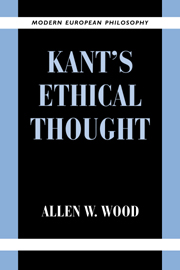Book contents
- Frontmatter
- Contents
- Preface
- Abbreviation
- Introduction
- I METAPHYSICAL FOUNDATIONS
- 1 Common rational moral cognition
- 2 Rational will and imperatives
- 3 The formula of universal law
- 4 The formula of humanity as end in itself
- 5 The formula of autonomy and the realm of ends
- II ANTHROPOLOGICAL APPLICATIONS
- Conclusion
- Notes
- Index
4 - The formula of humanity as end in itself
Published online by Cambridge University Press: 05 June 2012
- Frontmatter
- Contents
- Preface
- Abbreviation
- Introduction
- I METAPHYSICAL FOUNDATIONS
- 1 Common rational moral cognition
- 2 Rational will and imperatives
- 3 The formula of universal law
- 4 The formula of humanity as end in itself
- 5 The formula of autonomy and the realm of ends
- II ANTHROPOLOGICAL APPLICATIONS
- Conclusion
- Notes
- Index
Summary
Ends and determining grounds of the will
I.I. Motives and incentives FUL does not take us beyond the mere concept of a categorical imperative. In order to derive a second formula of the moral law, Kant turns to something more substantive. His aim is to show how a categorical imperative or practical law could be “connected (wholly a priori) with the concept of the will of a rational being as such” (G 4:426). In other words, he turns our attention to what it would require for a rational will to obey such an imperative or law. Kant distinguishes two kinds of grounds that can motivate a rational will: an objective ground, which is an end given by reason alone and valid for all rational beings, and a subjective ground, which is an end based on empirical desires. The former sort of ground he calls a “motive” (Bewegungsgrund), the latter an “incentive” (Triebfeder) (G 4:427–428).
When Kant inquires into the nature of “motives,” he is in effect trying to identify more precisely than he has already what it means to act “from duty.” Thus far it has been understood only as acting from respect for law, but that account deals only with the “form” of the will, not with its end or “matter.” We could also put it by saying that the earlier account told us nothing about the substantive value that might be contained in the moral law and call forth our respect for it.
- Type
- Chapter
- Information
- Kant's Ethical Thought , pp. 111 - 155Publisher: Cambridge University PressPrint publication year: 1999
- 1
- Cited by

